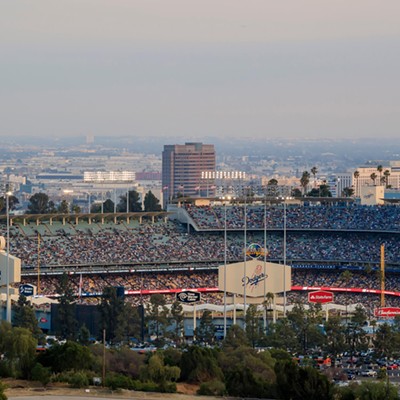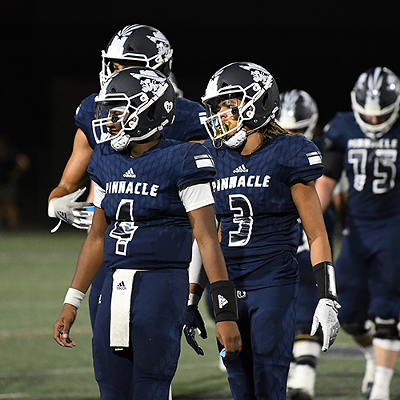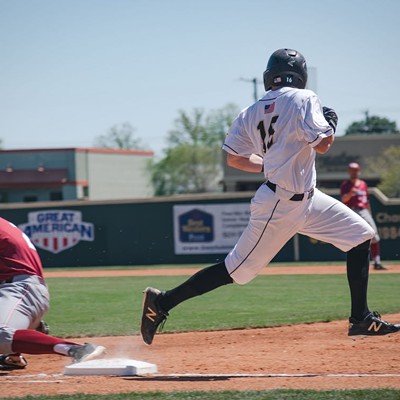In this place, good teams always triumph over collections of great individual players. The dunk is not revered as the ultimate play, but is seen as just one of many possible means to an end. In a pick-up game, John Stockton gets picked ahead of Allen Iverson, and Gary Payton gets picked ahead of everyone. (Rasheed Wallace doesn't get picked at all, because nobody wants his punk ass on the court.) Sports shows run highlights of great passes and gritty, man-to-man defense played away from the ball, and the announcers aren't all pasty-faced white guys who use hip-hop jargon in a feeble attempt to be down.
In this place, basketball is seen as the greatest and most challenging of all sports, the one that requires the greatest number of diverse physical skills and mental faculties to be successful. It's a sport populated by people with blinding foot speed and dazzling leaping ability, with uncanny peripheral vision and uncommon hand-eye coordination, with the upper-body strength to snatch the tough rebound and, at the same time, the soft hands and feathery touch needed to put the 6-foot shot back in the basket.
And yet, it is a sport in which the slow can outwit the fast, the earthbound can screen off the leapers, and the unselfish can knock off the unbelievable. In this place, the game is almost worshipped by the fans, held in awe by the masses, and treated with the utmost respect by those who are fortunate enough to participate in it.
If such a world existed, Luke Walton would be its undisputed king. Blessed with the lineage of being the son of the greatest college basketball player of all time and possessing a personal game that's allowed him to ascend on his own ability, Walton would rule that place with style and dignity.
Alas, he exists in this world, the one where crap-talkers get all the ink, thugs and druggies make millions, and kids grow up drooling over the game's style while learning nothing of its substance. Young people today don't learn how to dribble; they learn how to carry the ball while doing exaggerated crossovers. They can shoot the three, but they can't make a free throw. They can swat somebody's shot, but they don't have the footwork and discipline to guard somebody out away from the basket.
In this setting, Walton is like a Frank Sinatra set adrift in a world of Justin Timberlakes.
Occasionally, however, the two worlds intersect. It's like Brigadoon emerging from the Irish mists once every century. Or, for you guys who still live upstairs at Mom's house and work at the comic book store, it's like "The Tholian Web" episode of the original Star Trek--the one where Kirk actually wore a space suit and kept phasing in and out from the other dimension in which he was trapped.
Whatever the case, Walton is at a rare intersection between the real and the really cool. He's on a team that's the best in the country. He's surrounded by teammates who, despite some head-scratching lapses, seem to get it. And he's being coached by a Hall of Famer, Lute Olson. These next six weeks could be among the best times of his entire life.
LUKE WALTON WALKS INTO the Media Relations Office, deep in the bowels of McKale Center, carrying an oversized bowl and a spoon. He has walked from the house he shares with two other guys just off campus, eating Lucky Charms and milk along the way. As he arrives at the office, he is putting away the last spoonful.
The first question--generally the most important of any interview--comes out: "So, what are you going to do with the bowl?"
He eyes it, then mutters, "I don't know. Carry it around with me, I guess. I can't keep losing them."
He is cordial and polite. He answers all of the questions in a thoughtful, yet succinct manner. All the while, he seems genuinely confused as to why anyone would want to interview him. (Keep in mind this is someone who was on the cover of both Sports Illustrated and ESPN The Magazine earlier this season.)
"Dude, I'm boring," he says.
These days, he's also the local heartthrob, as well as the leading role model chosen by parents from here to Storrs, Conn., and back. He's a kid who did things right: a college graduate playing college basketball, a future pro who saw college not as brief stopover but a place where one of life's goals could be achieved. A true rarity, he stayed not four years in college, but five. He was named to just about every preseason All-America team there is.
Still, while the Arizona Wildcats sit atop the national rankings for the third time this season, it has been a maddening season for Walton. Injuries have set him back, and a badly sprained ankle will keep him from being 100 percent for the rest of the year. He has missed a few games entirely and has been hobbled in most of the rest of them.
His stats have been all over the place, and he has played just plain badly in a couple of games. He committed two quick fouls against California and had to sit for long stretches of that big game, and then, at Washington, he went 5-for-15 shooting and had five uncharacteristic turnovers.
Nevertheless, it's not an overstatement to note that the Cats are a much better team when he's on the floor.
"You know," he explains, "it's cool when you play with guys who are willing to do what's necessary to win. There's that cliché about 'Know your role,' but in a way, it's true. We have guys on this team who know what their strengths are and they bring them to the game. Everybody does what they need to do to make us successful as a team. And Coach O keeps us focused, to say the least."
It appears to be a perfect mix. Walton and his teammates move the ball, hit the boards, play smothering defense and shoot well from 2 feet and 22 feet.
"It's a good feeling, knowing that you can beat anybody," he smiles. "Not many athletes get to know that feeling. Every time we step on the court, we know we're the best. The only way we get beat is if we don't play our best."
A lot of college athletes get caught up in the blur of the moment or are completely overwhelmed by the enormity of the entire college situation. Walton, on the other hand, appears to be acutely aware of all that is going on around, and while he does a masterful job of holding down the enthusiasm, he knows that he's on a collision course with history. He's already half of one of only three father-son tandems to play in the NCAA Final Four.
He wants to be the younger half of the only duo that won the NCAA Championship.
ON MARCH 28, A week-and-a-half before this year's NCAA Championship game, Luke Walton will turn 23. Two days earlier, he'll mark the 30th anniversary of the night that his father, Bill Walton, put on the greatest display of basketball in the history of the NCAA Championships. Bill Walton's UCLA team was more than two-thirds of the way through a mind-boggling 88-game winning streak (a men's basketball record that will probably never be broken) when the team met Memphis State in St. Louis for the national title.
State (now called the University of Memphis) was led by Larry Kenon and Larry Finch, a killer inside-outside tandem that had steamrolled the opposition en route to the finals. Walton's Bruins were cool as ice, deadly efficient and just about ready for anything. As it turned out, nobody in the basketball world was ready for what happened that night.
It was a tight game, tied at halftime. Walton's teammates were having an off night, but the big, red-headed center was keeping them in the game. Walton scored on a variety of moves and tip-ins around the basket.
(In those days--indeed, throughout almost all of the 1970s--it was illegal to dunk the ball in high school and college basketball. In fact, a player couldn't even hold the ball over the imaginary cylinder that goes from the rim up to the ceiling and even drop the ball in the basket. The dunk had been outlawed after Walton's predecessor at UCLA, Lew Alcindor, had dominated the game with his combination of height, grace and coordination. Alcindor, who would change his name to Kareem Abdul-Jabbar, went on to dominate the NBA for two decades, although the pros never gave any thought to outlawing the dunk. After nine years, the no-dunk rule was tossed out.)
Bill Walton had had to play his college career without the dunk and had adapted to the rule by putting together a devastating array of offensive moves and shots. And they all came out that night.
Walton led his team to an impressive win by going a mind-blasting 21-22 from the floor. (Remember, no dunks!) Shooting the ball 22 times and having 21 go in is a remarkable achievement at any time. Doing it in the national championship game makes one legendary.
After a stellar collegiate career, Walton went on to lead the Portland Trail Blazers to their only NBA title in 1977. But chronic foot problems and multiple surgeries limited his effectiveness and he ended his career as a sub for the Larry Bird Celtics in the mid-1980s. Having been an anti-war activist in college, Walton solidified his image as an iconoclast by attending law school, having his name mixed up in the Patty Hearst drama, and becoming the most famous fan of the worst and most overrated rock band of all time, the Grateful Dead. (He passed the Grateful Dead thing down to his son, which might be considered a subtle form of child abuse.)
These days, Bill Walton is a TV announcer for the NBA, where he is a lighting rod for criticism and one of the very few breaths of fresh air in a professional league that seems headed down the same path that Major League Baseball took, one with a dwindling fan base, with players who are overpaid and underperforming and a regular season that's increasingly inconsequential and a post-season that is distorted and largely unsatisfying.
Of course, Luke Walton wants to be a part of that league, because even in an imperfect world, the NBA is the place to go after college, because you get to play basketball and they throw insane amounts of money at you for doing so. He really doesn't care where he plays as long as he can make a team and contribute.
As a fan, he likes the Sacramento Kings and the Dallas Mavericks. Not surprisingly, thanks to several European players on both rosters, these two teams come as close to playing basketball the right way as is possible in what's left of the NBA these days. It's like a time-warp effect, where the Europeans play basketball the way Americans did back in the '80s. Peja Stojakovic and Dirk Nowitzki play like Magic Johnson and Larry Bird did 20 years ago--the same way Luke Walton does today.
WE'LL NOW PAUSE AND dispense with the seven questions that all Tucsonans are dying to ask the 6-foot-8, 245-pound Walton:
Tucson Weekly: Is math your friend?
Luke Walton: Yeah, I like math. I'm good in it. I've got a brother who went to Princeton.
Do you cook?
Not really. But I eat.
Besides Hoosiers, what's your favorite sports movie? (Note: Baller wannabes might name Love and Basketball or Above the Rim as their favorite, but real basketball players will always answer Hoosiers. The most-common second-place answer is Remember the Titans.)
Lemme' see. Oh yeah, Major League. I really like that.
Why didn't you go to UCLA?
I wanted to play for Coach O(lson). If he hadn't recruited me, I probably would've have gone to UCLA. But I sure am glad I didn't have to.
Did you ever eyeball (Arizona softball star) Jennie Finch?
Naw, she was dating (one of my teammates). Can't do that.
So, do you think you could ever be a male cheerleader?
No way! (Pause) I'd have to do something that's competitive. I couldn't stand on the sidelines.
Who's the best-looking woman on TV?
I don't know. Penelope Cruz, I guess. I like that look.
LUKE WALTON LEADS A PRETTY simple life. He shares a house with teammate Isaiah Fox and Jesse Mermuys, a UA student and assistant boys basketball coach at Salpointe Catholic High School. Walton used to have a girlfriend, but she graduated and they split up. He mostly hangs out with his teammates or his roommates.
He gets up in the morning and goes to class. (He earned a degree in family studies last December and, because of an ankle injury, was able to attend his graduation the same day that his teammates were losing at Louisiana State.) Then he does some rehab on his ankle, goes to practice and then goes back for some more rehab and maybe to lift some weights.
He grabs something to eat (he likes Jack-in-the-Box or Boston Market) or maybe goes out to eat at Rosa's Mexican Restaurant on Fort Lowell Road. Back at the house, he plays video games with his roommates.
A couple weeks ago, he was playing some 007 game with Mermuys. The deal was: If Mermuys won, Walton would have to show up at the Salpointe-Canyon Del Oro boys basketball game dressed in Salpointe gear, sit behind the CDO bench and cheer for Salpointe. If Walton won, he would have to sit behind the Salpointe bench and yell for Lancer coach Brian Peabody to put Mermuys into the game.
Walton won, but before he could reach his spot behind the bench, he was surrounded by what appeared to be every 14-year-old girl in Tucson. He spent the game standing in a corner, being more patient and gracious than anyone could ever expect him to be.
Such is the life of the Golden Boy. It involves adjusting. He simply wanted to razz his friend; he ended up having to run a jailbait gauntlet.
In fact, there has been a lot of adjusting going on. He's probably not going to make many All-America teams, what with the nagging injuries and the missed games. His team has already blown its chance for an undefeated season (which was a long shot, at best, anyway). They're not going to be the first team to run the entire Pac-10 schedule without a loss.
But the big goals are still out there. They can win the Pac-10 title. They can win another Pac-10 Tournament title. And they can nail down the national championship that is actually expected of them. Such expectations have a way of becoming a huge burden.
If the Wildcats are going to accomplish these things, they're going to need a relatively healthy Luke Walton. He's going to have to help run the offense and anchor the defense, maybe grab the big rebound, make the sweet pass or hit the big shot.
And if he does manage to help Arizona win its second national title in seven years and the announcer asks him how he's able to be so focused, so dedicated, so able to filter out distractions.
I hope he says, right there on national TV: "Dude, I'm boring."














